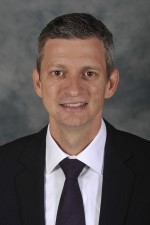
A month of departmental oversight changes are over for now at Western Carolina University’s College of Arts and Sciences.
On May 12, Dr. Wendy Ford was relieved of her of duties as dean of the College of Arts and Sciences, a position that on June 6 was handed on an interim basis to Dr. Gibbs Knotts, who has been dean of the Department of Political Science and Public Affairs since January 2008. In preparation for Dr. Knotts taking over, Dr. Niall Michelsen, associate dean of the College of Arts and Sciences, served as the acting dean from May 12-June 5.
Linda Seestedt-Stanford, WCU’s interim provost, made the announcement of Knotts’ appointment on May 26. With Knotts in place as the new interim dean, Seestedt-Stanford said she would like the national search for the new permanent dean position to begin as soon as possible. While Knotts is dean of the college, Chris Cooper, associate professor of political science and public affairs, and director of the Public Policy Institute, will serve as interim head of the Department of Political Science and Public Affairs. Todd Collins, assistant professor of political science and public affairs, will serve as interim director of the Public Policy Institute.
The decision to let Ford go was not budget related.
“There was no particular reason,” Seestedt-Stanford said. “We wanted to move in a different direction and we needed a different type of leadership to support my vision.”
Seestedt-Stanford said Ford was exceptional at identifying efficiency in her college, had a very objective outlook and all of the staff sincerely thanked her for what she did. Ford held the role of dean of the College of Arts and Sciences for four years.
“We are in a period of transitions and they are good, not bad,” she said.
Michelsen was not expecting having to serve in the dean position for nearly a month.
“Working with Dean Ford, the college has prepared all year for budget cuts while supplying the same quality of education to WCU students, while losing as few faculty and staff positions as possible,” Michelsen said. “This fundamental situation has not changed this month, but some of the burden has shifted to me temporarily. Fortunately, our office staff is very skilled and very supportive, and this has made the situation tenable.”
Seestedt-Stanford said Knotts was chosen to serve as interim dean because he is a highly valued member of the faculty, has a lot of positive relationships with people, and has administration experience from his experience as the associate dean of WCU’s Graduate School and Research, a position he held from July 2005 to December 2007. He has also been director of the Master of Public Affairs Program (January 2003 to June 2005) and received the 2004 Chancellor’s Distinguished Teaching Award and the 2010 University of North Carolina Board of Governors Award for Excellence in Teaching.
“He will do a great job and I really appreciate his open door policy for faculty, staff and especially students,” said Seestedt-Stanford.
Knotts said he is overwhelmed with emotions for being selected to lead the college.
“I’m both honored and excited to serve as interim dean of the College of Arts and Sciences,” said Knotts. “It is a great college with outstanding students, faculty, and staff.”
Knotts has a lot of work ahead of him as the new interim dean of the College of Arts and Sciences, which is Western Carolina’s largest undergraduate college and includes more than 180 full-time faculty members who serve more than 1,600 undergraduate student majors and master’s degree-seeking students in the humanities, sciences and social sciences. Eleven departments comprise the college – anthropology and sociology, English, history, modern foreign languages, philosophy and religion, communication, political science, biology, chemistry and physics, geosciences and natural resources, and mathematics and computer science.
Knotts has a series of issues to face, including maintaining quality and managing resources amidst budget cuts. He said that moving to the Dean’s Office will certainly take some adjustment, but feels his past leadership experience has prepared him and that he will receive a lot of help.
“There is a talented staff in the College of Arts and Sciences office and there is a great group of department heads that help to lead the college,” said Knotts.
With the search beginning for the permanent dean position, Seestedt-Stanford asked all the department heads in the College of Arts and Sciences, “What do you want in a dean?” The answers included: someone who knows where the university is going and is able to communicate this, someone with outstanding integrity and work ethic, someone with a collaborative leadership style, someone who works will with other colleges and someone who is a good communicator.
Responsibilities and tasks of being dean of the College of Arts and Sciences include: hiring, budgeting, supporting faculty and students, new programming, overseeing promotions and tenure, meeting equipment needs, deciding how many courses to offer, overseeing day-to-day decisions, fundraising, having a vision, advocating for the college and more.
“It is the best position because you can affect change being the dean,” Seestedt-Stanford said.
Knotts already has a few goals in mind.
“My goals as Interim Dean are to advocate for the college, help the college continue to align with the university mission and provide the best possible customer service to students, faculty, and staff,” Knotts said. “I am also a firm believer in collaborative leadership so I plan to work closely with faculty, staff, and students when making decisions.”
(Editor’s Note: Ford was unavailable for comment.)






